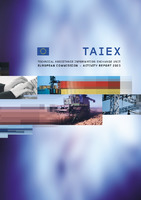| dc.description.abstract | The Copenhagen European Council in December 2002 saw the successful conclusionof negotiations with the first ten candidate countries, confirming the target that thosecandidate countries which were ready to do so would be invited to become EU memberstates from 2004. Regarding Bulgaria and Romania, the European Council stated that2007 would be the target for these countries to enter the Union. The Council alsocommitted the Member States to re-examine the status of Turkey by the end of 2004.Revised Accession Partnerships for the three countries were soon to follow. The challenge therefore in 2003 – the eighth year of TAIEXoperations – has been tohelp contribute to further strengthening administrative capacity in the candidate countriesso that this political momentum be maintained towards the first wave of accession in2004 and beyond. This translated into increased productivity and a high level of welltargeted technical assistance, using the most appropriate delivery mechanisms. In 2003, TAIEXassistance reached far more people than ever before. Assistance –whether seminars, workshops, meetings, trainings, study visits, expert visits orexchanges – rose by over 25% compared to 2002, both in number of events and in the number of officials from the candidate countries who benefited from Member Stateexpertise. This increase reflected a significant jump in demand from the candidatecountries covering all areas of the acquis. The Regional Training Programme alone, inwhich regional administrations are trained in the imple-mentation and enforcement ofimportant sectors of theacquisat the local level, served over 10,000 local officials. Assistance was also aimed at the training of those officials involved in the enforcement ofEuropean legislation. Training reached groups such as maritime safety inspectors ensuringthe safety of vessels operating in European waters, local inspectors monitoring theapplication of legislation in veterinary establishments, environmental inspectors checkingthe running of waste management plants, or indeed money laundering investigatorsworking in Financial Intelligence Agencies. TAIEXassistance is not only demand-driven, but has also been targeted in order to helpsupport broader policy objectives. In the field of justice & home affairs for example, morefocus was placed on assistance in the field of criminal judicial co-operation and fightingorganised crime, including combating terrorism. In the area of food safety, TAIEXhas alsohelped create working groups to oversee the preparation and implementation of nationaltraining programmes in each country. |

